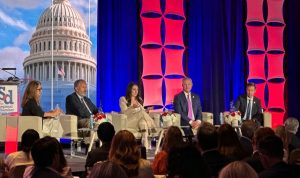The San Diego Regional Chamber of Commerce hosted its annual Congressional Luncheon on June 18, bringing together San Diego County’s congressional delegation, business leaders, and community stakeholders for a high-level discussion on national policy and regional priorities. Held before a packed audience, the event featured a moderated panel covering key topics such as immigration, defense, education, workforce development, and federal funding.
Congressmembers Sara Jacobs, Mike Levin, Scott Peters, and Juan Vargas participated in the discussion, moderated by Christine Moore, Executive Director of AT&T External Affairs. Congressman Darryl Issa could not attend the event but sent a video message apologizing for not attending.
Immigration dominated the conversation, with both Rep. Juan Vargas (D-CA 52) and Rep. Mike Levin (D-CA 49) sharply criticizing proposed federal deportation policies and calling for reforms rooted in due process and economic pragmatism.
“Immigrants are absolutely necessary for our economy to flourish and do well,” said Vargas, highlighting the essential roles undocumented workers play in agriculture, tourism, and hospitality. “This administration is going after the very people that work on these jobs,” he added, warning that aggressive immigration enforcement could harm California’s labor force and economy.
Vargas also stressed the importance of due process and legal resistance. “We’re doing everything we can to stop unlawful deportations in the courts—and we’ve been successful in several cases,” he said, referencing past efforts to bring back deported individuals who lacked fair hearings.
Congressman Levin echoed Vargas’s concerns, denouncing what he described as a politically motivated, quota-based approach to immigration enforcement. “They’ve turned this into a numbers game,” Levin said, referring to proposals that would mandate 3,000 deportations per day. “Those forces to go after peaceful, hard-working immigrants just to meet an arbitrary target.”
Throughout the event, attendees had the opportunity to submit questions directly to the congressional delegation, fostering a deeper exchange between policymakers and the public.
Congresswoman Sara Jacobs emphasized the economic importance of investing in care infrastructure during her remarks at the San Diego Regional Chamber event. “When we talk about strengthening our economy, both locally in San Diego and nationally, we have to recognize that care is essential,” Jacobs said. “Affordable, high-quality childcare and elder care allow more people, especially women, to enter and stay in the workforce. For every dollar we invest in care, we see a six-dollar return through increased labor participation, higher tax revenues, and lower long-term healthcare costs. It’s not just a social issue; it’s smart economic policy.”
Congressman Scott Peters warned that proposed Medicaid cuts could devastate healthcare access in his district and across the country. “Twenty-one percent of my constituents rely on our hospital systems,” Peters said. “If these cuts go through, hospitals will close. This isn’t just bad policy, it’s dangerous. We need a bipartisan solution that protects healthcare, not a reckless plan that puts lives at risk.”
U.S. Consul General in Tijuana, Christopher Teal, emphasized the importance of cross-border cooperation during the San Diego Regional Chamber of Commerce’s annual congressional luncheon on Tuesday.
“These meetings are essential because they bring together political leadership from both sides of the border,” Teal said. “While we continue to address key issues like immigration and security, economic collaboration remains one of the most critical aspects of the U.S.-Mexico relationship.”
Teal highlighted the significant trade and investment ties between California and Baja California, noting that maintaining and expanding those connections is a shared priority. “Our role is to work with federal, state, and local authorities—as well as the private sector—to keep cross-border trade moving, create jobs, and support American businesses operating in the region,” he said.
The consul general also noted that the U.S. consulate works closely with local governments in Baja to assist American citizens living, working, or visiting in the area. “We’ve built strong relationships with local leaders, and Baja remains a welcoming environment for American investment,” he added.
Kenia Zamarripa, Vice-President of International and Public Affairs at the San Diego Regional Chamber of Commerce, emphasized the importance of binational collaboration at the forum. “More than ever, it’s important to focus on what the U.S. and Mexico can achieve together,” she said, warning that divisive narratives in Washington risk overshadowing real opportunities. Zamarripa stressed that disengagement from cross-border partnerships limits progress on key issues like economic development, transboundary pollution, and migration, and called for a unified, bilateral approach to benefit both nations.
“This luncheon was a huge success,” said Chris Cate, President and CEO of the San Diego Regional Chamber of Commerce. “The more opportunities we have to speak directly with our federal delegation about the issues that matter to our business community and region, the better. We do a lot of advocacy work in D.C. and hearing their perspective here in San Diego is incredibly valuable.”



